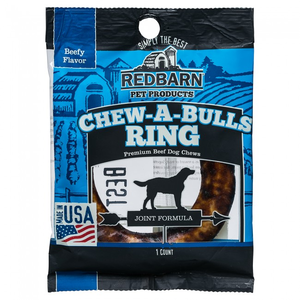Redbarn Chew-A-Bulls Beefy Flavor Chew-A-Bulls Ring Review
PawDiet has been helping pet owners since 2015. To fund our efforts, articles may include affiliate links; if you buy something through a link, we may earn a commission.
Review of Redbarn Chew-A-Bulls Beefy Flavor Chew-A-Bulls Ring
According to our most recent data, this product is intended for intermittent or supplemental feeding only.
Review of Ingredients
In our review of Redbarn Chew-A-Bulls Beefy Flavor Chew-A-Bulls Ring, we'll examine all 22 ingredients and highlight the nutritional contribution of each ingredient.
While the first few ingredients typically dominate the recipe's composition, ingredients in small quantities can still have a meaningful impact on the overall nutritional profile of the recipe.
Potato starch is a carbohydrate source that can provide energy for your dog while being gentle on their digestive system.
Beef liver is a nutrient-rich organ meat that provides essential vitamins and minerals, such as iron, zinc, and B vitamins, which support your dog's overall health and well-being. It is also a good source of high-quality protein, which helps maintain strong muscles and a healthy coat.
Vegetable glycerin is used as a natural sweetener and texture enhancer in dog foods.
Food starch is a carbohydrate source that provides energy for your dog's daily activities. It helps maintain your dog's energy levels and supports a healthy weight.
Beef pizzle is a protein-rich ingredient that provides essential nutrients and supports your dog's muscle development and overall health.
Chicken meal is a highly concentrated source of protein made from dehydrated and ground chicken. It provides essential amino acids for your dog's muscle development, tissue repair, and overall growth, making it a valuable ingredient for maintaining your dog's health and well-being.
Egg whites are a low-fat, high-protein food that can support muscle development and maintenance in dogs.
Cellulose is a natural source of dietary fiber that aids in digestion and helps maintain your dog's gastrointestinal health.
Sorbitol is a sugar alcohol used as a sweetener in dog food, providing a lower calorie option compared to traditional sugars while promoting oral health by reducing the risk of dental decay.
Caramel color is a natural coloring agent used to enhance the visual appeal of the dog food without impacting its nutritional value.
Fructose is a natural sugar that provides a small amount of energy and can help improve the taste of the dog food.
Lecithin is a naturally occurring fatty substance that can help support your dog's overall health. It plays a crucial role in maintaining cell membrane integrity and provides essential fatty acids for a healthy coat and skin. Additionally, lecithin aids in fat digestion and absorption, promoting optimal nutrient utilization.
Sorbic acid is a food-grade preservative used to maintain freshness and extend shelf life in dog food. It is generally recognized as safe for consumption in small amounts.
Sodium bicarbonate, also known as baking soda, can help maintain a balanced pH in your dog's stomach, aiding digestion.
Chicken fat (preserved with mixed tocopherols) is a source of essential fatty acids like omega-6 which help to maintain a healthy skin and coat. The tocopherols act as natural preservatives.
Chicken cartilage is a natural source of glucosamine and chondroitin, which are beneficial for joint health.
Dried cranberry is a natural source of antioxidants and dietary fiber, which can help support your dog's digestive health and urinary tract health.
Salmon oil is a rich source of Omega-3 fatty acids, which support your dog's skin and coat health, immune system, and cognitive function.
Dried blueberries are a natural source of antioxidants, vitamins, and minerals that support your dog's immune system, eye health, and overall well-being. This ingredient adds a burst of flavor and color to your dog's food, making it more enjoyable and nutritious.
Titanium dioxide is a white pigment used as a colorant in dog food. It is generally considered safe in small amounts but does not provide any nutritional benefits.
Ascorbic acid, or vitamin C, is an essential antioxidant that supports your dog's immune system and helps reduce inflammation.
Vitamin E supplement is an essential nutrient that helps support your dog's immune system, skin health, and overall wellness.
Review of Guaranteed Analysis
The guaranteed analysis of the Redbarn Chew-A-Bulls Beefy Flavor Chew-A-Bulls Ring indicates a minimum crude protein content of 3.00%. This relatively low protein content is likely contributed by the beef liver, beef pizzle, chicken meal, and egg white present in the ingredients. These are protein-rich ingredients, but given the minimum percentage, they are likely included in smaller amounts compared to other components of the treat.
The crude fat minimum of 1.00% suggests that this is a low-fat product. The sources of fat in the ingredients are likely the beef liver, chicken fat (which is preserved with mixed tocopherols), and to some extent, salmon oil. Chicken fat and salmon oil are particularly high-quality sources of fat, including essential fatty acids, but they are present in modest quantities, as reflected in the guaranteed analysis.
A maximum of 4.00% crude fiber is listed, which is a moderate amount for a pet treat. This fiber likely comes from ingredients such as potato starch, food starch, cellulose, and perhaps small contributions from the dried cranberries and dried blueberries. These ingredients help to provide the structural integrity of the chew and promote digestive health.
Lastly, the caloric content is specified as 2822.00 calories per kilogram. This energy value is influenced by all the macronutrients in the product – proteins, fats, and carbohydrates. The potato starch and food starch are likely the major contributors to the caloric content, as carbohydrates are an efficient source of energy. The fats present, like chicken fat and salmon oil, also contribute significantly to the calorie count, as fat is more energy-dense than proteins or carbohydrates.

